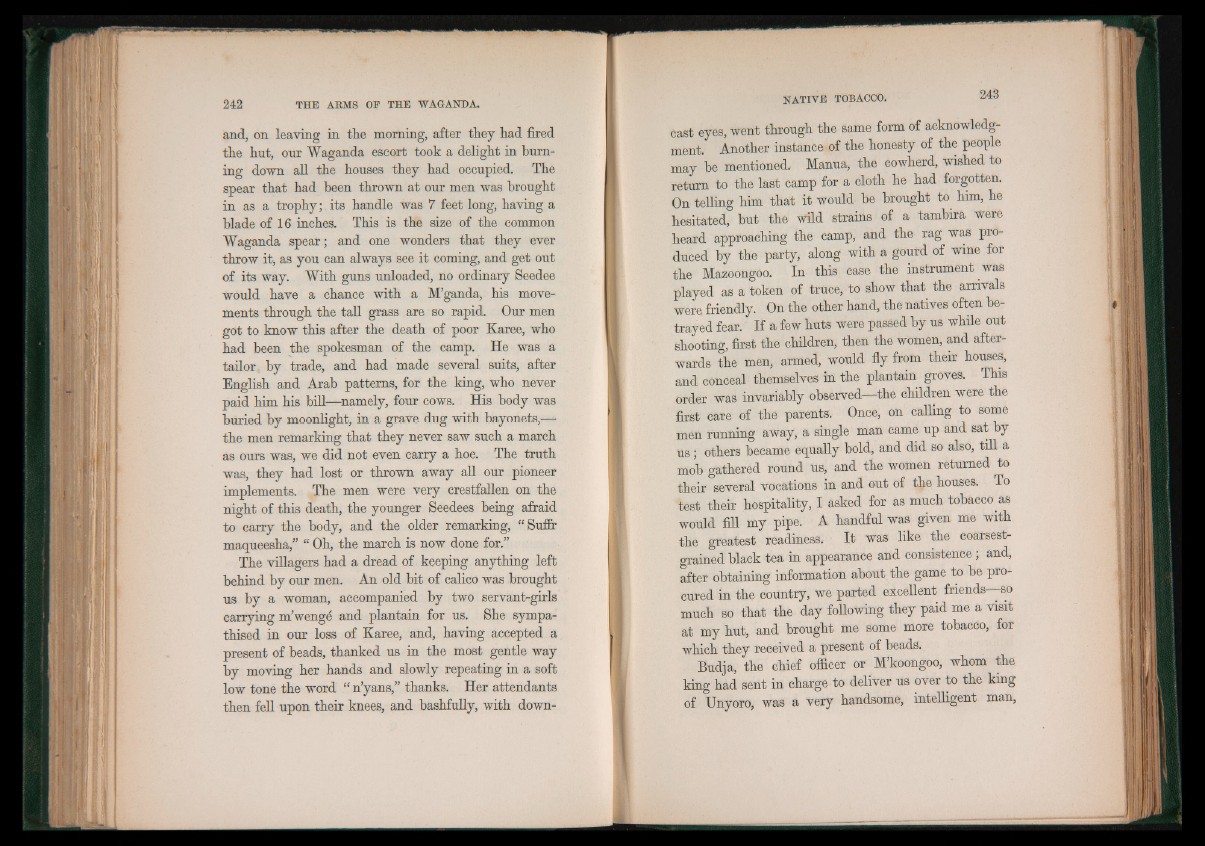
and, on leaving in the morning, after they had fired
the hut, our Waganda escort took a delight in burning
down all the houses they had occupied. The
spear that had been thrown at our men was brought
in as a trophy;, its handle was 7 feet long, having a
blade of 16 inches. This is the size of the common
Waganda spear; and one wonders that they ever
throw it, as you can always see it coming, and get out
of its way. With guns unloaded, no ordinary Seedee
would have a chance with a M’ganda, his movements
through the tall grass are so rapid. Our men
got to know this after the death of poor Karee, who
had been the spokesman of the camp. He was a
tailor by trade, and had made several suits, after
E n g lish and Arab patterns, for the king, who never
paid him his bill—namely, four cows. His body was
buried by moonlight, in a grave dug with bayonets,—
the men remarking that they never saw such a march
as ours was, we did not even carry a hoe. The truth
was, they had lost or thrown away all our pioneer
implements. The men were very crestfallen on the
night of this death, the younger Seedees being afraid
to carry the body, and the older remarking, “ Suffr
maqueesha,” “ Oh, the march is now done for.”
The villagers had a dread of keeping anything left
behind by our men. An old bit of calico was brought
us by a woman, accompanied by two servant-girls
carrying m’wenge and plantain for us. She sympathised
in our loss of Karee, and, having accepted a
present of beads, thanked us in the most gentle way
by moving her hands and slowly repeating in a soft
low tone the word “ n’yans,” thanks. Her attendants
then fell upon their knees, and bashfully, with downcast
eyes, went through the same form of acknowledgment.
Another instance of the honesty of the people
may "be mentioned, Manua, the cowherd, wished to
return to the last camp for a cloth he had forgotten.
On telling him that it would be brought to him, he
hesitated, but the wild strains of a tambira were
heard approaching the camp, and the rag was produced
by the party, along with a gourd of wine for
the Mazoongoo. In this case the instrument was
played as a token of truce, to show that the arrivals
were friendly. On the other hand, the natives often betrayed
fear. If a few huts were passed by us while out
shooting, first the children, then the women, and afterwards
the men, armed, would fly from their houses,
and conceal themselves in the plantain groves. This
order was invariably observed—the children were the
first care of the parents. Once, on calling to some
men running away, a single man came up and sat by
u s ; others became equally bold, and did so also, till a
mob gathered round us, and the women returned to
their several vocations in and out of the houses. To
test their hospitality, I asked for as much tobacco as
would fill my pipe. A handful was given me with
the greatest readiness. I t was like the coarsest-
grained black tea in appearance and consistence; and,
after obtaining information about the game to be procured
in the country, we parted excellent friends—so
much so that the day following they paid me a visit
at my hut, and brought me some more tobacco, for
which they received a present of beads.
Budja, the chief officer or M’koongoo, whom the
king had sent in charge to deliver us over to the king
of Unyoro, was a very handsome, intelligent man,